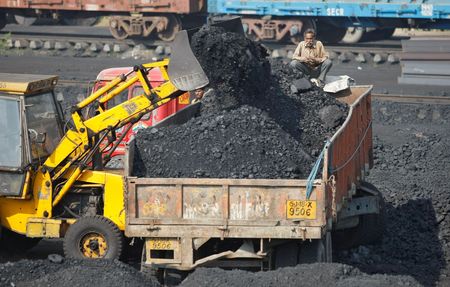By Clyde Russell
LAUNCESTON, Australia (Reuters) – India’s coal woes show no sign of abating, with lower domestic supply expected to boost the need for imports, with this likely to keep seaborne prices at elevated levels.
India cut the amount of coal domestic power plants can expect to receive in June by 11.1%, with utilities now forecast to get 56.2 million tonnes, down from an earlier estimate of 63.3 million tonnes.
The power ministry also called for higher imports to meet the shortage of domestic supplies, according to a ministry document reviewed by Reuters.
This means that India is likely to try to boost imports further, even though prices for many seaborne grades of coal are still close to record levels.
Australian benchmark Newcastle thermal coal futures ended at $408 a tonne on Wednesday, down 1.9% from the prior close, and 7.3% below the record close of $440 on March 2, reached in the wake of Russia’s invasion of neighbouring Ukraine that raised fears over sanctions on Russia’s exports.
Despite the recent retreat in prices, it’s worth noting that Newcastle futures are up 141% since the end of last year and are almost four times their levels in late May last year.
Physical Newcastle cargoes also continue to attract high prices, with globalCOAL setting its price at $434.33 a tonne on Wednesday.
Australia is the world’s second-largest shipper of thermal coal behind Indonesia, and is the top exporter of coking coal, used to make steel.
India has been buying more coal from Australia since China imposed an informal ban on imports from Australia amid an ongoing political dispute with Canberra.
This forced a reshuffling of seaborne coal around Asia, with China buying more from Indonesia and Russia, while India switched to supplies from Australia and South Africa, the fourth-biggest exporter behind third-placed Russia.
Moscow’s Feb. 24 attack on Ukraine is forcing yet another re-alignment of coal flows in Asia, with South African cargoes being pulled to energy-hungry Europe, which in turn is prompting India to buy more from Indonesia.
India has been able to successfully switch to buying more coal from Indonesia, primarily because China, the world’s biggest buyer of the polluting fuel, has been easing back on imports in recent months amid strong gains in domestic output.
India’s coal imports are estimated at 20.05 million tonnes in May by commodity analysts Kpler, which would be the most since March’s 22.26 million, which in turn was the highest since April 2019.
SUPPLY SWITCHING
May’s imports also show the rotation of India’s suppliers, with shipments from Indonesia expected to be around 11.06 million tonnes, up from 8.13 million in April.
Imports from South Africa are expected to drop to 1.19 million tonnes from 1.26 million in April and 3.14 million in March.
India’s imports from Australia are pegged at 4.30 million tonnes, down from 4.94 million in April and 5.16 million in March.
Drilling down to split between imports of thermal and coking coal shows that Australia is losing ground on the thermal front, with imports of this grade expected at 895,853 tonnes in May, down from 1.18 million in April and 2.60 million in May of last year.
It’s perhaps not surprising that India is trying to buy more thermal coal from Indonesia given the massive price advantage, even once differences in energy values are taken into account.
Indonesia coal with an energy value of 4,200 kilocalories per kilogram (kcal/kg> traded on the Singapore Exchange ended at $89.50 a tonne on Wednesday.
It has fallen 36% since its record high of $140 a tonne on March 3, reflecting softer Chinese demand.
While the Newcastle benchmark is a higher quality 6,000 kcal/kg, at a price of more than four times the lower grade Indonesian coal it’s entirely uncompetitive and is probably maintaining a presence in Indian imports because of the lack of alternatives.
Overall, it seems likely that India will seek to maximise thermal coal imports from Indonesia while minimising those from Australia.
The joker in the pack is Russia, which will be seeking new customers for its coal, which is increasingly being rejected by European buyers and also by Japan and South Korea.
So far there is little evidence that India’s imports are increasing dramatically, with arrivals from Russia estimated by Kpler at 411,439 tonnes in May, up modestly from April’s 344,708 and March’s 357,972.
(Editing by Richard Pullin)











